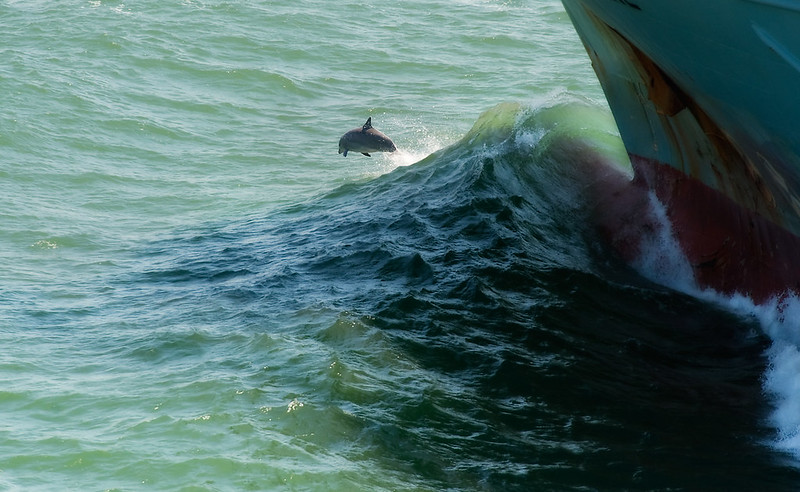We are witnessing a bitter struggle between shipowners and shippers whereby the latter are constantly confronted with sharply rising costs of maritime transport while the first are making profits almost never seen before. And yet it is very important that both enemies reconcile and work together on a more sustainable shipping sector, argues SWZ|Maritime’s editor-in-chief Antoon Oosting in his latest opinion piece.
In every issue of SWZ|Maritime, SWZ|Maritime’s editor-in-chief Antoon Oosting writes an opinion piece under the heading “Markets” about the maritime industry or a particular sector within it. In the December 2021 issue, he discusses the failure of IMO’s latest MEPC meeting.
Shipowners and shippers working together may now seem like dreaming of a miracle. Yet, waiting for international politics in the framework of the IMO (International Maritime Organization of the United Nations) has no sense as was proven again by the meeting of IMO’s MEPC (Marine Environment Protection Committee) from 22 to 26 November.
The 174 member states and three associate members of the IMO failed to agree on a more ambitious pathway to bring shipping to a net-zero future on the emission of greenhouse gases (GHGs). Sure: ‘In view of the urgency for all sectors to accelerate their efforts to reduce emissions as emphasised in the recent IPCC reports and the Glasgow Climate Pact, the IMO recognises the need to strengthen the ambition of the initial IMO GHG Strategy during its revision process and it has agreed to initiate the revision of its GHG strategy,’ declares the IMO in a press release. But the IMO gives itself another two years for this process. A final draft for a revised IMO GHG Strategy cannot be expected before the MEPC 80, which is scheduled to meet in spring 2023.
The only matter the MEPC77 could agree on was the adoption of a resolution on the voluntary use of cleaner fuels in the Arctic to reduce black carbon emissions. In other work, the MEPC adopted a strategy to address marine plastic litter from ships; adopted revised guidelines for exhaust gas cleaning systems (EGCS) and agreed the scope of work on discharge water of EGCS; and considered matters related to the Ballast Water Management Convention. So, just all very soft promises and no thorough measures and new regulations to counter the massive and dangerous problem of climate change.

Extremely poor outcome
Then it is fully to be understood that the shipping sector is very disappointed about this extremely poor outcome of the deliberations in the IMO framework. As it is not the IMO itself that is under siege of ever more agitative NGOs that attack the shipping industry for their emissions of GHGs and the growing contribution of sea transport to the threatening change of the climate.
Especially in Europe, shipowners have to deal with an ever-growing burden of restrictions and soon will come in effect the extra levies within the framework of the EU-ETS scheme for CO2 rights that will have to be paid in Europe when sailing to and from European ports.
Reacting to the failure of the MEPC to make any significant progress, the secretary general of the ICS (International Chamber of Shipping, the umbrella organisation of shipping-interest groups), Guy Platten, took an unprecedented hard line: ‘A missed opportunity to decarbonise shipping at MEPC77. We are disappointed that the words and commitments made by governments at COP26 have not yet been translated into action. This week’s meetings have missed the opportunity to take forward a range of GHG reduction measures, which would accelerate the development of zero-emission ships that are urgently needed at scale to decarbonise our sector. It’s almost as if COP26 never happened.’
Also read: IMO MEPC meeting on shipping emissions ‘kicks can down the road’
Stop kicking the can down the road
According to Platten ‘governments can’t keep kicking the can down the road; every delay moves us further away from reaching pressing climate goals. We will continue to work with governments to agree to the suite of measures, which the industry has proposed, including the 5-billion-dollar R&D fund as an immediate step to be followed by a levy-based carbon price for shipping. The adoption of both these measures will be the only way to deliver on net-zero emissions from shipping by 2050 while ensuring an equitable transition that leaves no one behind.’
He adds: ‘The message from the industry at COP26 was clear; time is running out and we must do everything in our power to decarbonise now. Industry will continue to press IMO to act as the importance of addressing climate change is too great to give up on. There was a clear recognition from many more countries that there is an urgent need to significantly increase R&D spending. But we are disappointed that insufficient time was dedicated to allow IMO member states to take a decision on the 5-billion-dollar fund at this session.’
‘All we are asking is for governments to let business to get on and do the things that need to be done. We are not even asking for money or the type of subsidies that other sectors receive. This is a no brainer at a time when we do not have time to prevaricate. The IMO Maritime Research Fund is the only proposal on the table ready for immediate agreement. If it is not taken forward soon, we fear this will signal to the world, following COP26, that IMO is no longer truly serious about maintaining its leadership on GHG issues and that others may then move in to fill the vacuum. We will continue to work with governments to ensure that concerns are addressed so that this fund can be implemented as soon as possible,’ Platten concludes.
Not that the IMO doesn’t realise how important it is that the shipping sector also takes part in reducing the emission of GHGs. ‘The world is watching us,’ IMO secretary general Kitack Lim told the delegates attending the opening day of the MEPC77 virtual meeting. The South-Korean Lim is well aware of the fact that we cannot wait any longer to decarbonise industries wherever possible: ‘COP26 is still very fresh in our minds, emphasising that we are no longer considering climate change as it will impact future generations, but with the very real and present threat to our generations.’
Also read: ICS, IMO and GCF seek to kickstart zero carbon R&D fund
After day one hope was dashed
Many countries at COP26 in Glasgow two weeks before the MEPC meeting, including major shipping nations, called for a much more ambitious policy to green shipping. This promised hope that something could be reached at the IMO. But after day one all hopes for a far stricter GHG policy for the shipping sector had been dashed.
At that first day, delegates discussed the Marshall Islands’ and Solomon Islands’ resolution proposal for zero-emission shipping by 2050, a far stricter target than the current ambition of a fifty per cent cut of GHGs from shipping based on a baseline set in 2008. The Marshall Islands is the world’s third shipping register or flag state after Panama and Liberia. But with the Solomon Islands, it is also one of the nations that has most to fear from climate change and rising sea levels that threaten to engulf most of the islands the nations of the Pacific call their home.
According to the report of Sam Chambers in his daily newsletter Splash 24/7, just eight countries supported the zero by 2050 resolution: Canada, Japan, New Zeeland, Ukraine, the UK, the US, Vanuatu and Iceland. A total of 31 countries – the EU27, Georgia, South Korea, the Bahamas and Norway – supported the 2050 zero-emission target, but not the resolution.
Notably, several EU countries (Belgium, Finland, Denmark, France, Germany, Hungary and Sweden) endorsed the “Declaration on Zero Emission Shipping by 2050” at COP26, but failed to support a resolution at the MEPC 77 meeting to actually make that the goal for shipping.
Also read: ‘The research is there, but who will invest in zero-emissions ships?’
Opposition of the fossil lobby
The problem of the IMO is that new rules and regulations for global shipping based on an ambitious GHG reduction strategy, preferably as soon as possible to come to net-zero, must be agreed unanimously. And the reality is that quite some states and their leaders (such as a Putin or Bolsonaro) are still not convinced of the necessity to act against GHG emissions now and not in the far future.
Again, according to Splash 24/7, several countries spoke against the 2050 resolution and the 2050 zeroemission target, including Brazil, China, Russia, Saudi Arabia, South Africa and the United Arab Emirates. Except for South Africa, these are all oil-producing countries that of course don’t want to give up this lucrative business too soon.
After this deplorable turn of events at the IMO MEPC, it is clear that the push for decarbonising global shipping has to come from other stakeholders in the industry. First and foremost, it is of course the first responsibility of the shipowners, but also of the cargo owners (shippers).
Shipowners know they can no longer invest in a ship that can only run on heavy fuel oil with a scrubber. A ship must be ready for alternative, cleaner, more sustainable fuels. In mid-November, Clarksons Research reported that the implementation of green technology in shipbuilding is growing. Uptake of alternative fuels has continued to progress steadily, with 4.2 per cent of the fleet on the water and 34.0 per cent of the orderbook in tonnage (GT) terms capable of using alternative fuels or propulsion.
This includes 29.7 per cent of orderbook tonnage set to use LNG (546 units), 2.5 per cent to use LPG (95 units) and 1.8 per cent due to use other alternative fuels (about 200 units; including methanol (22), ethane (10), biofuels (2), hydrogen (3) and battery/hybrid propulsion (150)). Over 244 ships in the fleet and 95 in the orderbook are designated “LNG ready”, while there are now 24 “ammonia ready” and 5 “hydrogen ready” vessels on order.
Picture (top) by Louis Vest, Flickr.








